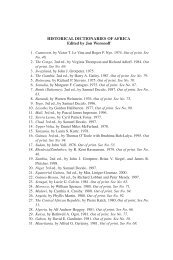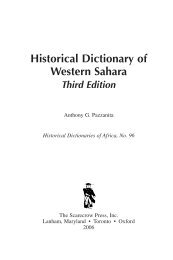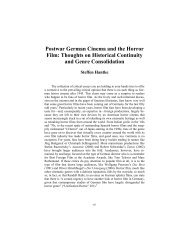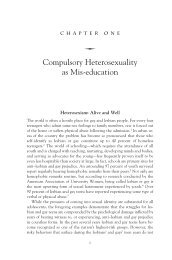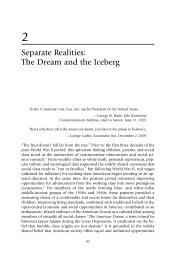Historical Dictionary of the Gypsies (Romanies) - Scarecrow Press
Historical Dictionary of the Gypsies (Romanies) - Scarecrow Press
Historical Dictionary of the Gypsies (Romanies) - Scarecrow Press
Create successful ePaper yourself
Turn your PDF publications into a flip-book with our unique Google optimized e-Paper software.
Reader’s Note<br />
For typographical reasons, Romani words cited are spelled in accordance<br />
with general international usage, not in <strong>the</strong> standard alphabet adopted by<br />
<strong>the</strong> fourth World Romany Congress for writing <strong>the</strong> language.<br />
•č ch, pronounced as in church<br />
• sˇ sh, as in ship<br />
•zˇ zh, as in leisure<br />
•xas in loch or German doch<br />
•rris a guttural or retr<strong>of</strong>lex r (as opposed to trilled or flapped r), depending<br />
on <strong>the</strong> dialect<br />
It has regrettably not been possible to reproduce in one font all <strong>the</strong> accents<br />
used in all <strong>the</strong> languages <strong>of</strong> Europe.<br />
Gypsy and Traveler have been capitalized and spelled thus—except in<br />
citations, names <strong>of</strong> organizations, and book titles. This volume uses <strong>the</strong><br />
term Romani for <strong>the</strong> Gypsy language and Romany (Roma) for <strong>the</strong> people.<br />
Gypsy and Romany are used as synonyms throughout <strong>the</strong> text except in entries<br />
referring to Asia; here <strong>the</strong> term Gypsy implies an industrial or commercial<br />
nomad (a so-called peripatetic) not necessarily <strong>of</strong> Indian origin.<br />
The definition <strong>of</strong> who is a Gypsy varies. This dictionary includes as<br />
<strong>Gypsies</strong> those who are accepted as such by <strong>the</strong> community or who proclaim<br />
<strong>the</strong>mselves to be <strong>Gypsies</strong>. A number <strong>of</strong> non-Gypsy organizations<br />
and non-<strong>Gypsies</strong> whose life or works are relevant to Gypsy history have<br />
also been included in <strong>the</strong> dictionary. They are identified by <strong>the</strong> name in <strong>the</strong><br />
entry header being in italics, for example, SHAKESPEARE, WILLIAM.<br />
Cross-references in <strong>the</strong> text are in bold type. The terms Gypsy, Rom,<br />
Roma, Romani, and Romany on <strong>the</strong>ir own are, however, never printed<br />
in bold.<br />
xiii




